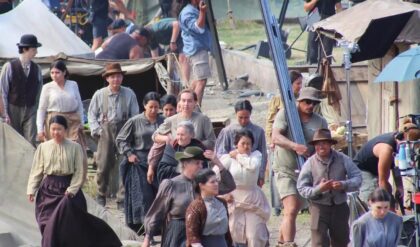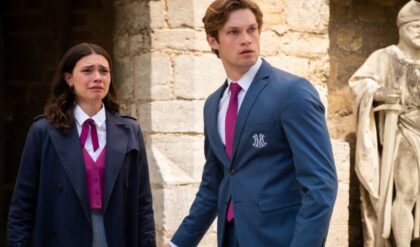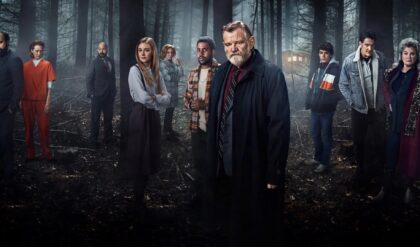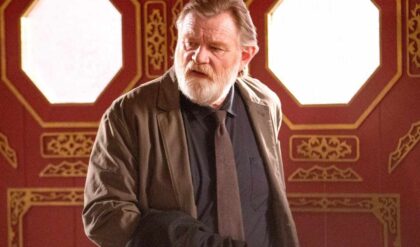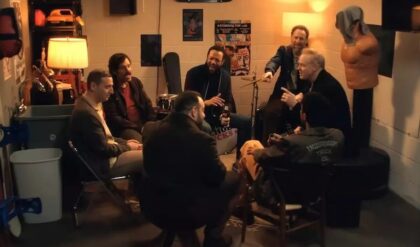
Oscar-winning actress Cate Blanchett is in Toruń, Poland, this week to celebrate the art of cinematography at the pioneering Camerimage Film Festival, where she is serving as president of the event’s main competition jury.
The two-time Oscar winner has previously led the juries of both the Venice and Cannes film festivals — arguably the film world’s two most prestigious events. But, in many ways, Camerimage is also a natural fit for her. Famously a thespian to her core, the actor is also an avowed movie mega-fan, known for rattling off obscure references in interviews, as well as taking an increasingly hands-on approach as a producer to all aspects of the filmmaking process for the projects she joins. The Polish festival could hardly ask for a jury chair more astute to the nuances of craft behind the camera as well as in front of it.
However, Blanchett has landed in Toruń during a particularly tumultuous year. In August, the industry group Women in Cinematography launched a petition urging Camerimage to do more to support the work of women cinematographers, who remain drastically under-represented in the trade. But rather than committing to improving representation at the festival — as the Cannes, Berlin and Tokyo film festivals have done in recent years — Camerimage’s founder published an editorial that seemed to argue that pushing for greater female representation could result in programming with diminished artistic quality.
The reaction from the international film community was swift, with several leading cinematography guilds publicly condemning the remarks, and filmmakers Steve McQueen (Blitz) and Coralie Fargeat (The Substance) pulling out of planned appearances in protest. Blanchett and her fellow jury members stuck with the event, though, as did other high-profile industry attendees like Alfonso Cuarón, cinematographer Ed Lachman, Shogun star Hiroyuki Sanada and others.
Blanchett, fresh off the success of Apple TV+’s Disclaimer, is participating in a moderated talk in Toruń Wednesday night, where she is expected to discuss the issue of gender representation and other challenges facing the film industry.
The Hollywood Reporter caught Blanchett on the first day of Camerimage for a brief chat at Toruń’s upscale Hotel Bulwar on the banks of the Vistula River.
You must get invited to so many interesting film festivals and cultural events around the world. What drew you to accepting the invitation to participate in Camerimage for the first time this year?
Well, I had heard about this festival for a long time, and it always sounded like something very special, because it’s very rare that those people behind the camera are celebrated and given the space in the way that they are here. So, to unpack the collaboration between cinematographer and director, and I think in my case, between cinematographer and actor, is something I was very interested in spending a week doing. It’s not something that’s talked about much, actually.
I wanted to ask you about that. As a layperson, it’s pretty easy to picture an actor’s collaboration with other aspects of the filmmaking process. You’re in constant communication with your director, of course; you perform the writer’s words; you do fittings and wear the costume designer’s work; and you enter into the worlds created by the production designer. But with the cinematographer, I suppose you’re existing within their light and their frame. But what is that relationship like?
Well, your director is always steering the Queen Mary through very icy waters. They have a lot of concerns when cut is called and before the next take, and oftentimes the actor is not the first thing they are concerned with. So, I’ve developed this relationship with the cinematographers where I’ll subtly perceive them. You can feel them moving like some sort of underwater creature during the take, and after the take, there’s a decompression. And over the days and weeks that you work with them, you get to know when they’ve received something that is worth keeping.
Oftentimes, I’ll look at the cinematographer or the operator and go [Blanchett tilts her head ever so slightly], and they’ll go [Blanchett now nods her head ever so slightly] — and I know exactly what they mean. They’re not wanting to undermine the director or anything like that, but they’re supporting you using the frame in a more powerful way. I have learned so much about how to use the frame from working with extraordinary DPs — many of whom have been honored here at this festival. I first heard about Camerimage through Remi Adefarasin, who won the Golden Frog for Elizabeth back in 1999. Obviously, also Ed Lachman, who’s here to receive the lifetime achievement award [Blanchett collaborated with Lachman on the Todd Haynes films I’m Not There and Carol]; Florian Hofmeister [Tár]; and we produced Warwick Thornton’s The New Boy, which won the Golden Frog; and Mandy Walker, who shot the very first film I was ever in [1996’s Parklands]. Each time you work with these people — who have such different points of view and light so differently and prioritize certain things in the frame differently — you get expanded by that experience.
Of course, working with great directors is paramount. But say, for example, on Disclaimer, once I know I’m working with Alfonso [Cuarón], the very next question is, “OK, but who’s shooting it?” And it was Emmanuel Lubezki and Bruno Delbonnel. So you start to get a sense, because of the crude knowledge of both those cinematographers’ work, of what the world is that you’re entering into. So then when you read the script again, it’s already starting to lift off the page, because of whose look it’s going to be. You know, I can look at your sand shoe [Blanchett gestures to my shoe, which suddenly feels far too casual for the occasion], and if Ed Lachman shot it, or Mandy Walker [Elvis] shot it, or Agnes Goddard [Beau Travail] shot it — it’ll be an entirely different sand shoe, and we will be made to feel and think about it in an entirely different way.
Well, you are an especially informed reader, to be able to project that into a script.
Well, yeah… But it’s a real symbiotic dance that you have with the light, as an actor. One of my all-time favorite cinematographers, Sven Nykvist, he said that he was always trying to strive for simplicity. The way he lit the face, you can do less, because you know that the cinematographer is completing the image for you. I sound like I’m in Jerry Maguire — “You complete me!” — but cinematographers really do. They complete you. They help you become more simple in some moments and more complex in others. As an actor, you’re only part of it. And none of it would happen if they didn’t light you.
So, we’ve landed here at Camerimage in what could turn out to be a pivotal year in the festival’s history. There’s this controversy regarding the founder’s remarks about the representation of women cinematographers in the lineup that has unfolded. What is your read on what was said, and how the festival has handled it? And what went into your thinking about how you would respond to it as the jury chief and a participant this year?
In the last few days, the British Society of Cinematographers and Women in Cinematography have responded in a very positive way about the fact that these issues have been raised yet again, sadly. As Anna Higgs, who is also on the jury with me, put it: “The work is never done.” Festivals are an opportunity to unpack that stuff and to have meaningful conversations. Festivals provide a chance to do this in a public-facing way but also privately because they bring us together as an industry. These challenges concern all of us — not just our female DPs, but their trans, nonbinary and male counterparts. So, I think there’s a real opportunity to have meaningful dialog this week, and I’m excited by that. Of course, our main job on the jury is to celebrate and highlight the films that have been selected — and it’s a really robust and interesting selection. But on a personal level, I’ll say that some of my favorite cinematographers are women — women who’ve really changed the way I look at cinema. Agnès Godard; Maryse Alberti [The Wrestler], whose work I just adore; and again, Mandy Walker, of course.
So, before Camerimage, you’ve been on the jury of both the Cannes and Venice film festivals. It’s quite an opaque process from the outside. Can you peel back the curtain for us a little? What’s the experience of being on a festival jury actually like?
I talked to Guillermo [del Toro] before I went to Cannes, and he said: “Just make sure everyone sits in a different seat every day.” Directors always give you the best pieces of incredibly simple advice. I’m not sure what it says about us as a species, but it’s something that we all do. If we have to keep returning to the same room for a meeting, over time we’ll start returning to the same seats. And Guillermo said, “If you let everyone keep returning to the same seats, the same person will speak first every day, and your jury will settle into a fixed dynamic.” So I really took that to heart, and I would get there a little early and sit somewhere else and force everyone to keep changing their point of view on each other.
Selfishly, whenever I’ve joined a jury I’ve been thinking about what I might get to learn from these amazing other filmmaker’s perspectives. It’s always an evolving conversation. Early on, you say, “OK, if today was the day, and we had to choose from these three films we’ve seen, which would it be?” And then you just keep going that way. It’s also amazing how, once you really start picking through and discussing a film, your views can completely change. I remember there was a film that year in Cannes that the jury had seen together, and I really did not connect with it. But then Andrey Zvyagintsev and Denis Villeneuve started talking about it in a way where I immediately thought, “OK, I really need to go back and see that film again.” To me, the instinct is never to try to win the argument. I’d rather say, “I deeply respect you both, so I want to take another look and see if I can see what you’ve seen.” And I did — and it was completely transformative.
